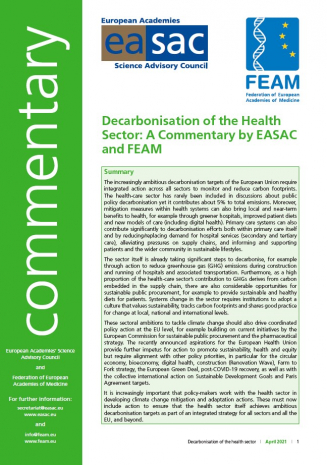Carbon footprint of healthcare
The increasingly ambitious decarbonisation targets of the European Union require integrated action across all sectors to monitor and reduce carbon footprints. The health-care sector has rarely been included in discussions about public policy decarbonisation yet it contributes about 5% to total emissions. Moreover, mitigation measures within health systems can also bring local and near-term benefits to health, for example through greener hospitals, improved patient diets and new models of care (including digital health). Primary care systems can also contribute significantly to decarbonisation efforts both within primary care itself and by reducing/replacing demand for hospital services (secondary and tertiary care), alleviating pressures on supply chains, and informing and supporting patients and the wider community in sustainable lifestyles.
Reducing the carbon footprint of the health sector
The sector itself is already taking significant steps to decarbonise, for example through action to reduce greenhouse gas (GHG) emissions during construction and running of hospitals and associated transportation. Furthermore, as a high proportion of the health-care sector’s contribution to GHGs derives from carbon embedded in the supply chain, there are also considerable opportunities for sustainable public procurement, for example to provide sustainable and healthy diets for patients. Systems change in the sector requires institutions to adopt a culture that values sustainability, tracks carbon footprints and shares good practice for change at local, national and international levels.
What is the EU doing about climate change?
These sectoral ambitions to tackle climate change should also drive coordinated policy action at the EU level, for example building on current initiatives by the European Commission for sustainable public procurement and the pharmaceutical strategy. The recently announced aspirations for the European Health Union provide further impetus for action to promote sustainability, health and equity but require alignment with other policy priorities, in particular for the circular economy, bioeconomy, digital health, construction (Renovation Wave), Farm to Fork strategy, the European Green Deal, post-COVID-19 recovery, as well as with the collective international action on Sustainable Development Goals and Paris Agreement targets.
It is increasingly important that policy-makers work with the health sector in developing climate change mitigation and adaptation actions. These must now include action to ensure that the health sector itself achieves ambitious decarbonisation targets as part of an integrated strategy for all sectors and all the EU, and beyond.
The health care sector - leading the way to the net zero carbon economy
Decarbonisation of the Health Sector, a new joint commentary by the European Academies' Science Advisory Council (EASAC) and the Federation of European Academies of Medicine (FEAM) emphasises the responsibility of the health sector to reduce its own GHG emissions, and work with other sectors to accelerate decarbonisation of the wider economy.
The growing and potentially disastrous effects of climate change on mental and physical health - including increased exposure to extreme heat, floods and droughts; the effect of declining crop yields on nutrition, increasing incidence of vector-borne diseases such as dengue and those indirect effects mediated through socioeconomic systems such as increasing poverty and displacement - have come more into focus in recent years. They imply significantly increasing and unforeseen challenges for our health care.
“With healing as its mission, the health care sector has good reasons to become a leader in climate solutions. In some countries, we already see pioneering initiatives by the health sector to cut its carbon footprint,” explains Volker ter Meulen, Chair of EASAC’s Biosciences Programme.
Local and near-term benefits to health
“The best part is that decarbonising the health sector will not only help the climate”, explains Robin Fears, Director of EASAC’s Biosciences Programme. “We see significant opportunities from green procurement, greener spaces and better building structures, through to healthier patient diets based on sustainably grown food, and digital health and other innovative models of patient care. These mitigation measures within health care systems can encourage more efficient use of resources and bring local and near-term benefits to health.”
“Tackling climate change should be seen as integral part of the sector’s mission to provide high quality patient care and to promote public health,” adds Andrew Haines, Professor of Environmental Change and Public Health at the London School of Hygiene and Tropical Medicine.
“This also implies shifting focus from cure to prevention, including by addressing social, environmental and economic causes of diseases. Supporting people to make healthier and more sustainable choices has the potential to reduce the need for hospital visits.”
A big opportunity for the European Union
EASAC and FEAM welcome the increasingly ambitious decarbonisation targets of the EU. However, they regret that so far, the health-care sector has rarely been included in discussions about decarbonization at European level. They see a big opportunity for the EU to be more involved in health issues and provide recommendations as to how to promote such initiatives.
“Ambitions of the health sector should drive and be driven by coordinated policy action at the EU level, for example building on current initiatives by the European Commission for sustainable public procurement and the pharmaceutical strategy,” explains FEAM President George Griffin.
Leadership by the health care sector can help to overcome barriers to transformative change by demonstrating the health benefits of decarbonisation across a range of sectors - including energy, food, transport and housing. “There is an opportunity for the EU to drive international action: This year, COP26 presents an unparalleled opportunity for accelerating commitment to Paris Agreement targets, in which all sectors must play their part,” concludes Griffin.


